Abstract
Cataract blindness is a public health problem of major proportions in developing countries. Intracapsular cataract extraction with aphakic spectacles has been the standard surgical technique for restoring sight. Because of image magnification in the operated eye, however, the result in unilaterally blind patients is less than satisfactory. Fortunately, with the availability of low-cost intraocular lenses (IOL) and ophthalmologists trained in extracapsular surgery, it is now practical to intervene successfully in the unilateral case. The need for increased attention on the quality of the visual high prevalence of cataract blindness in developing countries and an increasing cataract incidence due to an aging population require substantial increases in surgical volume. The third issue relates to cost. If significant increases in surgical volume and quality of outcomes are to be realized without an increased need for external funding, service delivery must be made more efficient. The expansion of IOL surgery for unilateral blindness is a favourable trend in ensuring financial sustainability of delivery systems; patients can be operated on while still economically productive and able to pay rather than waiting for bilateral blindness and a less favourable economic and social impact. If the quality, volume, and cost issues are to be successfully addressed, operational and structural changes to eye care delivery systems are necessary. These changes can be effected through training, technology introduction, management of facilities, social marketing, organizational partnerships, and evaluation. With improved understanding of the critical factors in successful models their widespread replication will be facilitated.
Full text
PDF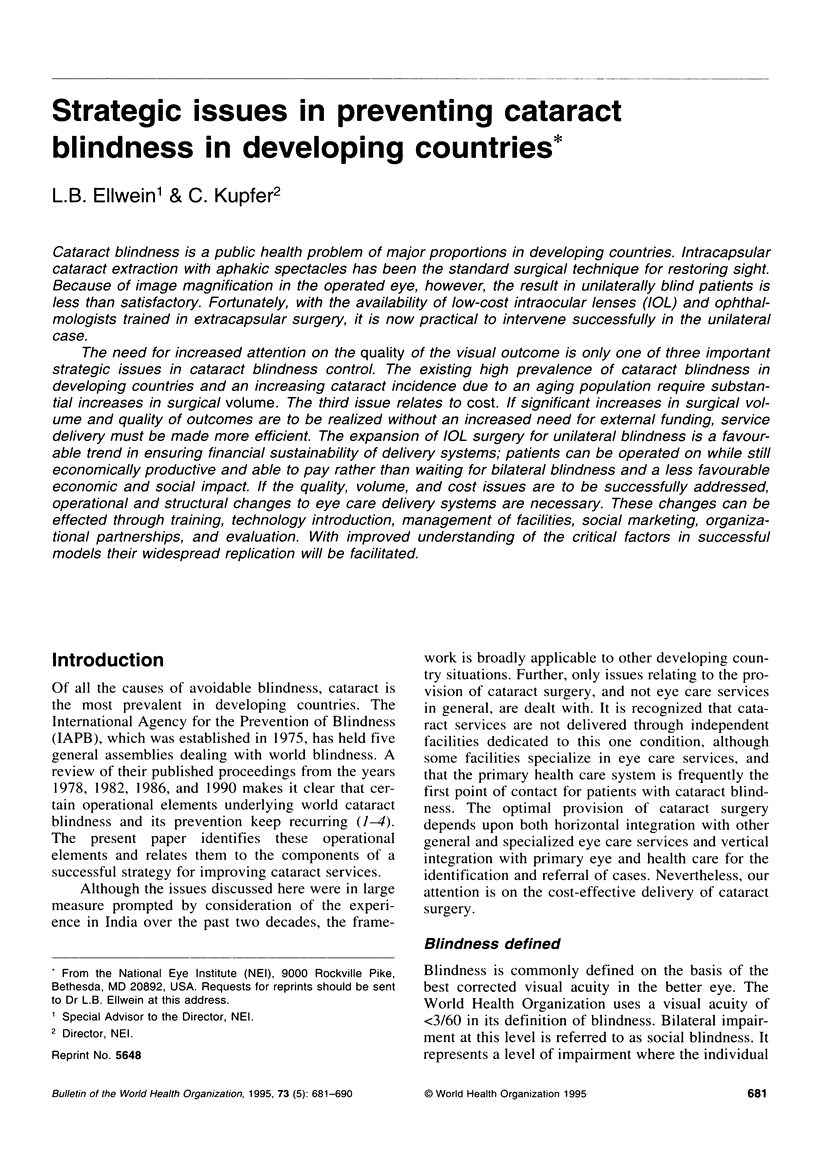
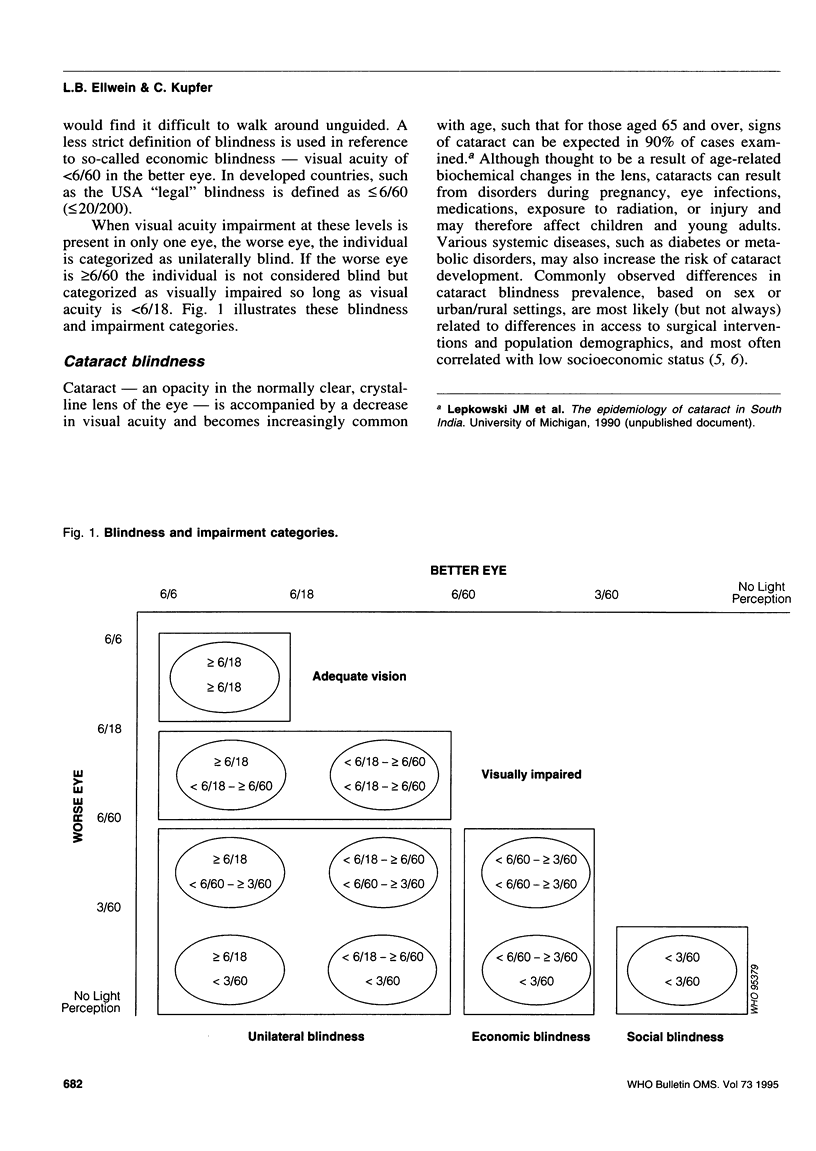
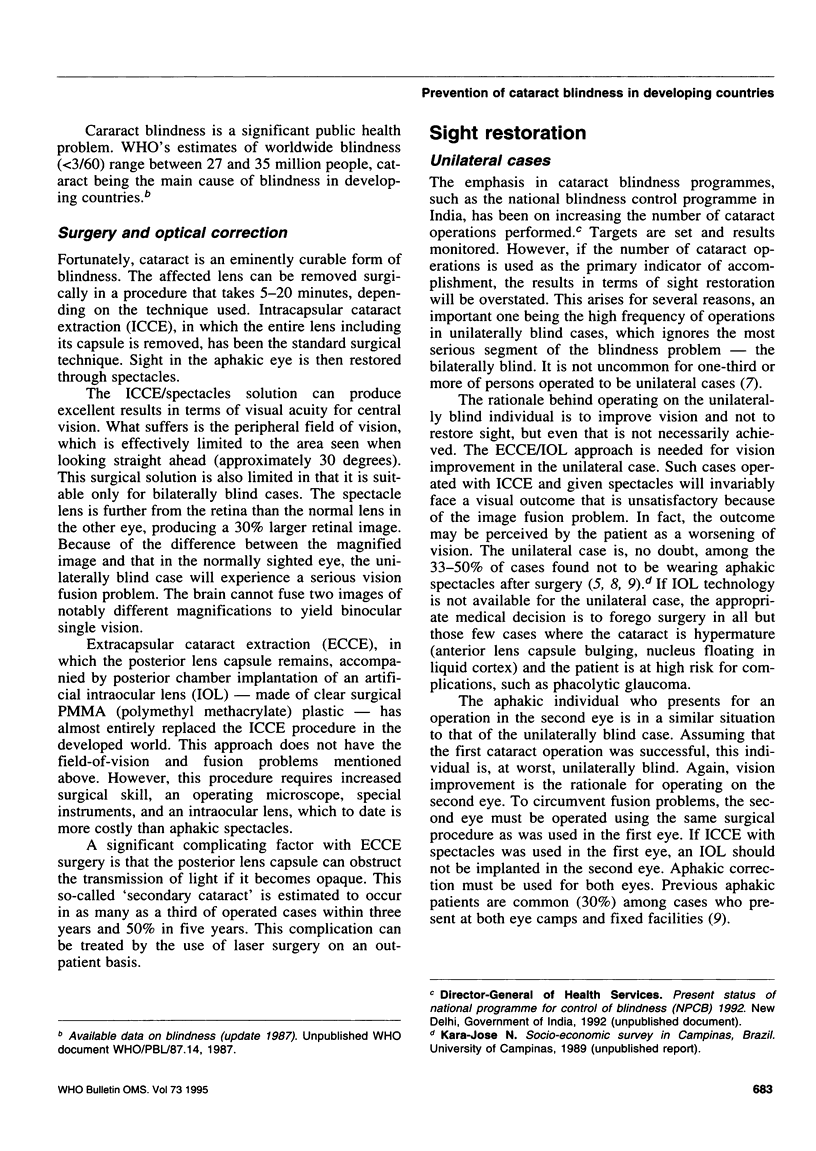
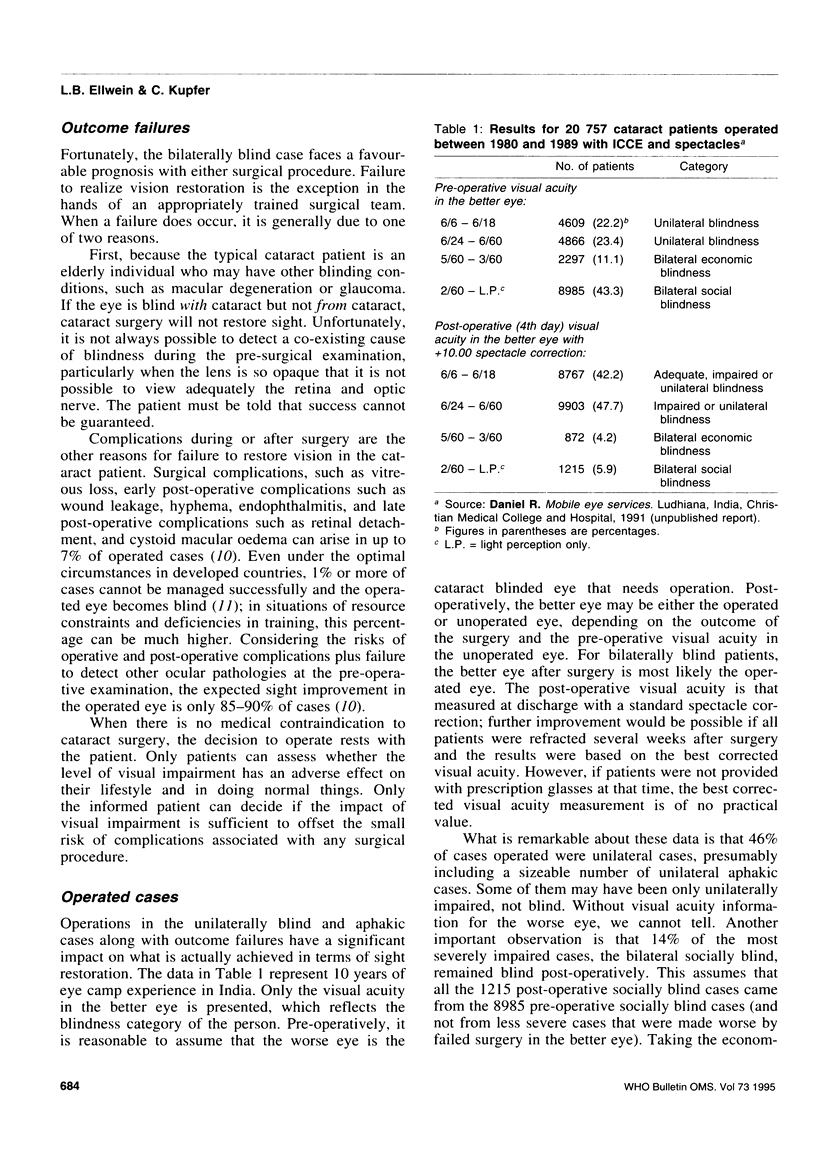

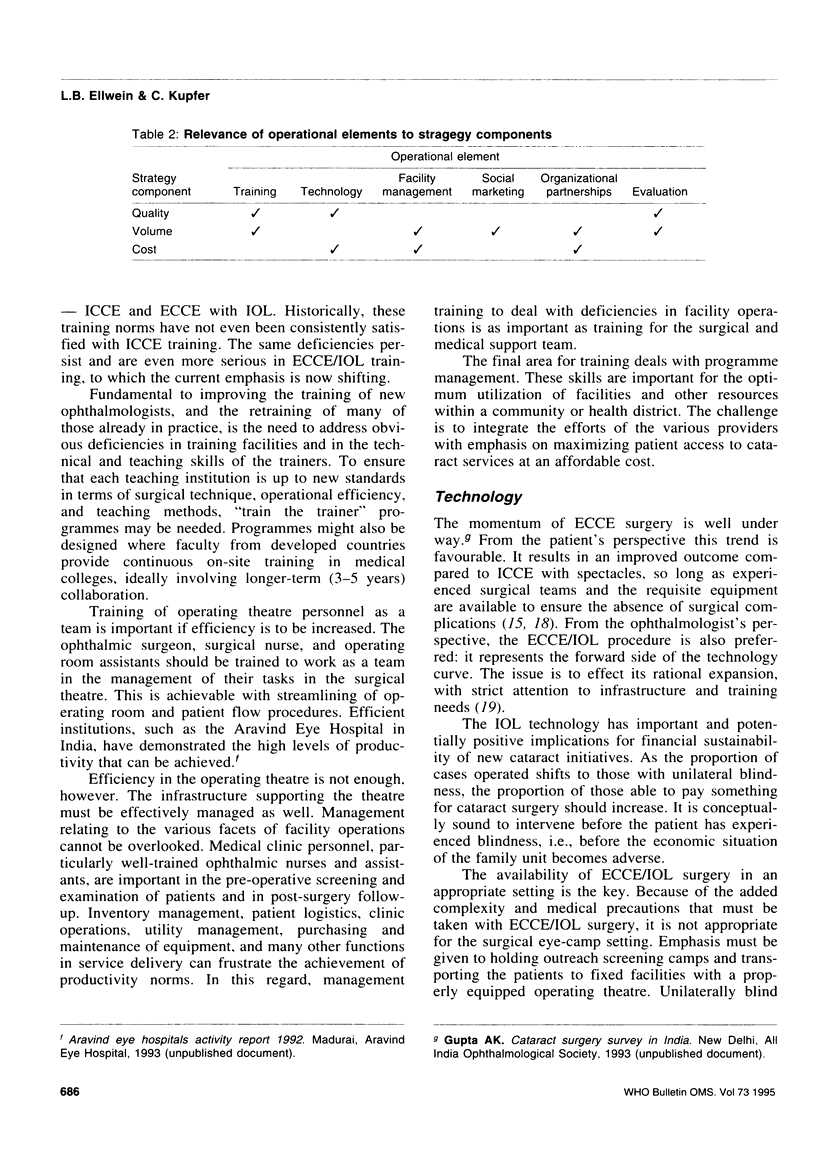



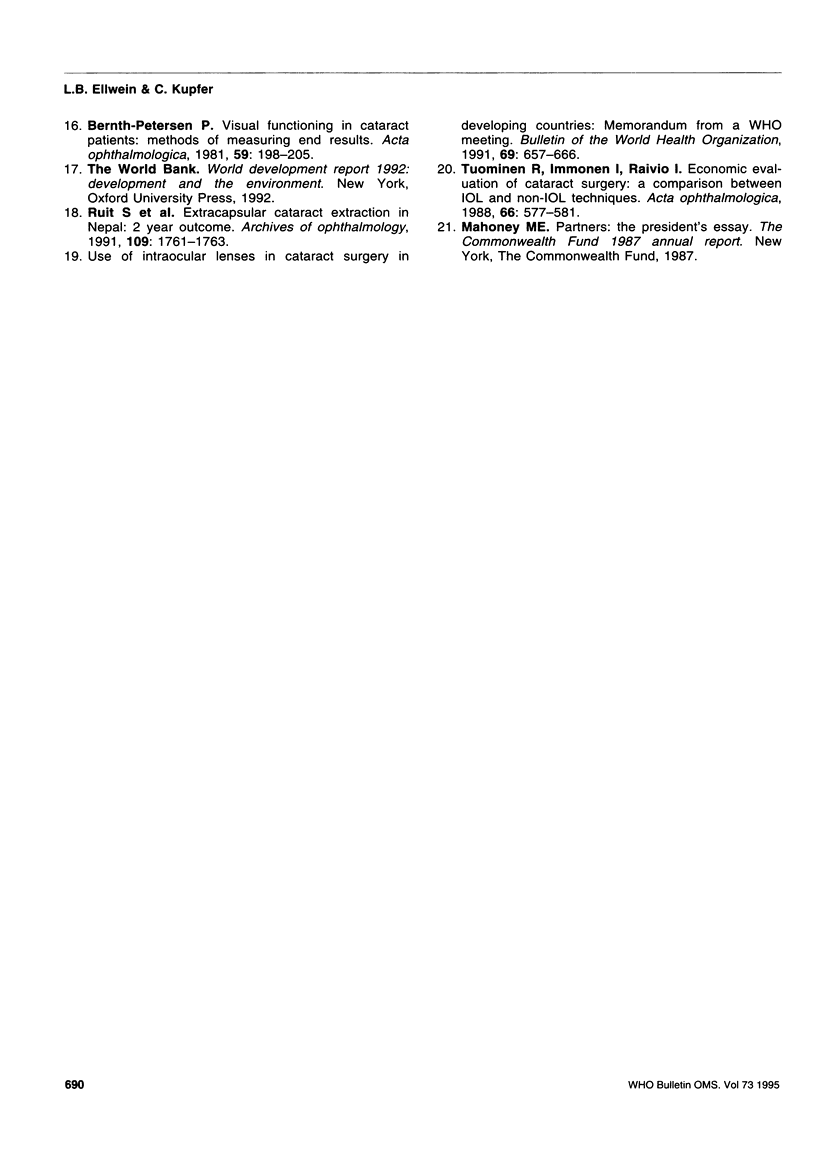
Selected References
These references are in PubMed. This may not be the complete list of references from this article.
- Bernth-Petersen P. Visual functioning in cataract patients. Methods of measuring and results. Acta Ophthalmol (Copenh) 1981 Apr;59(2):198–205. doi: 10.1111/j.1755-3768.1981.tb02979.x. [DOI] [PubMed] [Google Scholar]
- Brilliant G. E., Brilliant L. B. Using social epidemiology to understand who stays blind and who gets operated for cataract in a rural setting. Soc Sci Med. 1985;21(5):553–558. doi: 10.1016/0277-9536(85)90040-1. [DOI] [PubMed] [Google Scholar]
- Egbert P. R., Buchanan M. Results of extracapsular cataract surgery and intraocular lens implantation in Ghana. Arch Ophthalmol. 1991 Dec;109(12):1764–1768. doi: 10.1001/archopht.1991.01080120148046. [DOI] [PubMed] [Google Scholar]
- Ellwein L. B., Lepkowski J. M., Thulasiraj R. D., Brilliant G. E. The cost effectiveness of strategies to reduce barriers to cataract surgery. The Operations Research Group. Int Ophthalmol. 1991 May;15(3):175–183. doi: 10.1007/BF00153924. [DOI] [PubMed] [Google Scholar]
- Hogeweg M., Sapkota Y. D., Foster A. Acceptability of aphakic correction. Results from Karnali eye camps in Nepal. Acta Ophthalmol (Copenh) 1992 Jun;70(3):407–412. doi: 10.1111/j.1755-3768.1992.tb08588.x. [DOI] [PubMed] [Google Scholar]
- Jose N. K., Contreras F., Campos M. A., Delgado A. M., Mowery R. L., Ellwein L. B. Screening and surgical intervention results from cataract-free-zone projects in Campinas, Brazil and Chimbote, Peru. Int Ophthalmol. 1990 May;14(3):155–164. doi: 10.1007/BF00158313. [DOI] [PubMed] [Google Scholar]
- Pizzarello L., Ellwein L. B. The choice of cataract surgical techniques in developing nations: operations research considerations. Int Ophthalmol. 1990 May;14(3):147–154. doi: 10.1007/BF00158312. [DOI] [PubMed] [Google Scholar]
- Reidy A., Mehra V., Minassian D., Mahashabde S. Outcome of cataract surgery in central India: a longitudinal follow-up study. Br J Ophthalmol. 1991 Feb;75(2):102–105. doi: 10.1136/bjo.75.2.102. [DOI] [PMC free article] [PubMed] [Google Scholar]
- Ruit S., Robin A. L., Pokhrel R. P., Sharma A., DeFaller J. Extracapsular cataract extraction in Nepal. 2-year outcome. Arch Ophthalmol. 1991 Dec;109(12):1761–1763. doi: 10.1001/archopht.1991.01080120145045. [DOI] [PubMed] [Google Scholar]
- Sommer A., Tielsch J. M., Katz J., Quigley H. A., Gottsch J. D., Javitt J. C., Martone J. F., Royall R. M., Witt K. A., Ezrine S. Racial differences in the cause-specific prevalence of blindness in east Baltimore. N Engl J Med. 1991 Nov 14;325(20):1412–1417. doi: 10.1056/NEJM199111143252004. [DOI] [PubMed] [Google Scholar]
- Tuominen R., Immonen I., Raivio I. Economic evaluation of cataract surgery: a comparison between IOL and non-IOL techniques. Acta Ophthalmol (Copenh) 1988 Oct;66(5):577–581. doi: 10.1111/j.1755-3768.1988.tb04383.x. [DOI] [PubMed] [Google Scholar]


